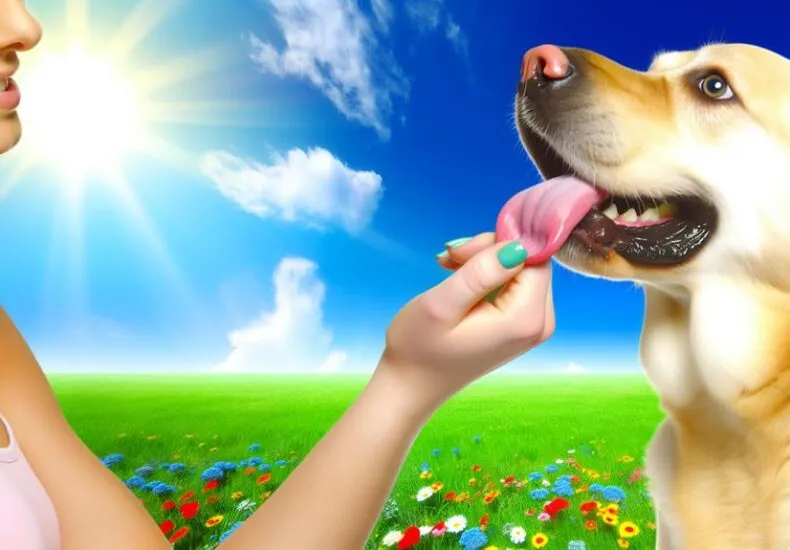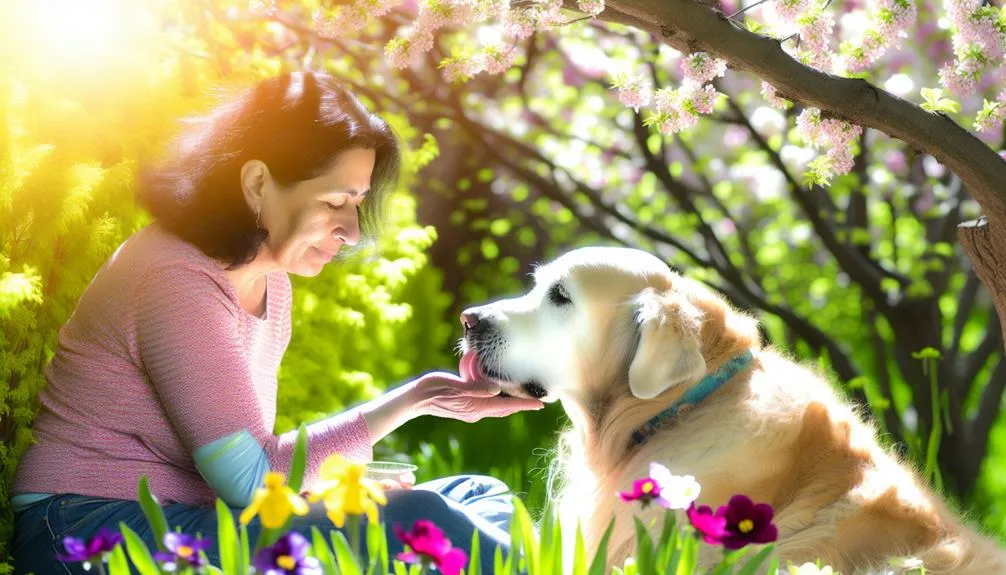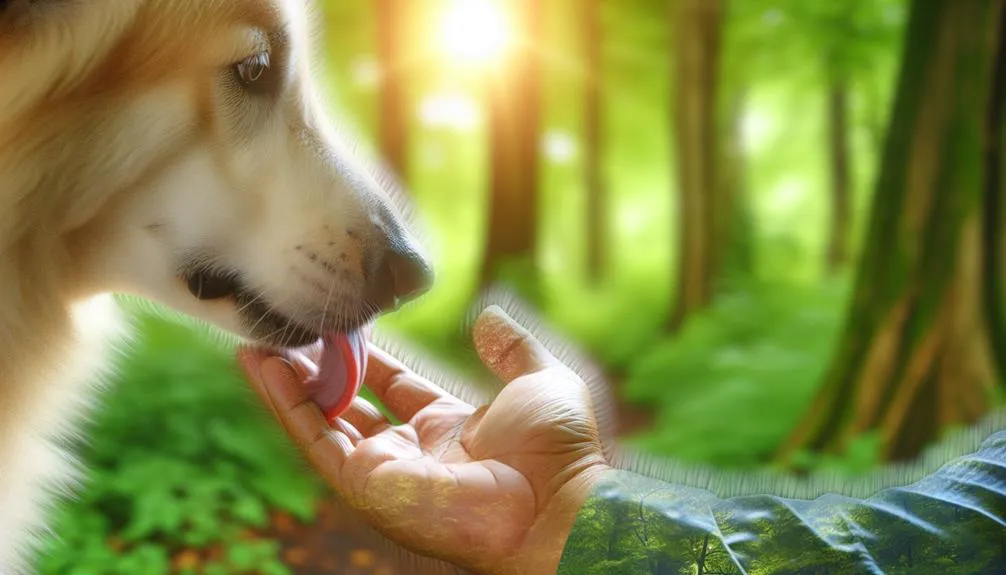
Why Do Dogs Lick You
When your dog greets you with a series of enthusiastic licks, it's hard not to wonder what's going through their mind. While many people interpret this behavior as a simple display of affection, the reasons behind it can be quite intricate. From instinctual behaviors inherited from their ancestors to subtle forms of communication, each lick can convey a different message. So, what's really motivating your furry friend to express their feelings this way, and how might it affect your relationship?
instinctual behavior From Ancestors
Dogs lick you for various reasons, but one significant factor is their instinctual behavior inherited from their ancestors. This behavior is deeply rooted in their pack mentality, reflecting traits that have been passed down through generations. In the wild, canines rely on their pack for survival, and licking serves several vital purposes in this social structure.
One of the primary functions of licking is to reinforce bonds within the pack. When a dog licks another, it's often a sign of submission, inviting acceptance and harmony. This behavior is essential for establishing order and maintaining relationships among pack members. As a dog owner, you become part of your pet's 'pack,' and those licks may be their way of expressing loyalty and respect.
Another aspect of this ancestral instinct is related to nurturing. Mother dogs lick their puppies to clean them, stimulate their bodily functions, and provide comfort. This instinct remains with adult dogs, manifesting as licking towards humans, which can be interpreted as a nurturing gesture. It's their way of showing care, even if their licking might feel a bit excessive at times.
Understanding these instinctual behaviors helps you appreciate your dog's actions more fully. Instead of viewing licking as a mere quirk, recognize it as a reflection of their pack behavior and ancestral instincts—an ancient language of connection that continues to thrive in the modern world.
Social Bonding and Affection
Licking plays an essential role in social bonding and affection among dogs, often serving as a bridge between canines and their human companions. When your dog licks you, it's not just a quirky behavior; it's a fundamental way for them to express love and strengthen the emotional connection you share. Within the canine world, licking is a means of reinforcing pack hierarchy, signaling trust and submission to those they regard as leaders.
This behavior is particularly poignant because it reflects the depth of your relationship. Through licking, dogs show they feel safe and cherished in your presence. It's their way of saying, "You're part of my pack." This connection can evoke strong emotions, both for you and your dog.
To illustrate this bond, consider the following:
| dog's Action | Emotional Response |
|---|---|
| Licking your hand | Trust and affection |
| Nuzzling against you | Seeking comfort |
| Wagging tail while licking | Joy and excitement |
| Licking your face | Display of love |
| Cuddling after licking | Desire for closeness |
Each lick serves to deepen your emotional connection, reinforcing the loyalty and love that define your relationship. Understanding this behavior can help you appreciate the nuances of your bond with your dog. So, the next time your furry friend showers you with licks, remember that it's a heartfelt expression of their affection and place within your shared pack.
Communication of Needs

Understanding your dog's Licking behavior goes beyond mere affection; it also serves as a means for them to communicate their needs. Dogs are not only expressive creatures but also rely heavily on Body Language and emotional expression to convey what they want. When your dog licks you, it can indicate several underlying needs or feelings that require your attention.
Here are four common reasons your dog may lick you to communicate their needs:
- Hunger or Thirst: If your dog is licking you persistently, they might be signaling that it's time for a meal or they need water.
- Attention Seeking: Your dog may be trying to get your attention, letting you know they want to play or need some companionship.
- Comfort or Reassurance: Licking can be a self-soothing behavior. If they're feeling anxious or stressed, they might lick you for comfort, expressing their need for reassurance.
- Discomfort or Pain: Sometimes, licking can indicate that something's wrong. If your dog is licking an area of their body or you unusually, they might be trying to communicate discomfort or pain.
Taste and Exploration
When your dog licks you, it's not just about affection; it's also a way for them to explore their environment through taste. Dogs possess a high sensitivity to taste, which allows them to gather information about what they're interacting with. By using their tongues, they're engaging in a natural behavior that helps them learn more about you and their surroundings.
Taste Sensitivity in Dogs
Dogs have a remarkable sense of taste that plays an essential role in their exploration of the world. With about 1,700 canine tastebuds compared to your 9,000, their ability to detect flavors is unique and influential. Their taste receptors allow them to discern various flavors, influencing their licking habits and dietary preferences.
Here are a few key factors that contribute to a dog's taste sensitivity:
- Flavor Preferences: Dogs often gravitate towards specific flavors, like meaty or savory, impacting their food choices.
- Texture Sensitivity: The texture of food can greatly affect their enjoyment and willingness to eat, as many dogs prefer certain consistencies.
- Dietary Influences: What a dog is fed during their formative years can shape their preferences and habits throughout their life.
- Sensory Exploration: Licking is not merely about taste; it's part of how dogs explore their environment, helping them understand different surfaces and substances.
Understanding these aspects can deepen your appreciation for your dog's licking habits and how they interact with their surroundings.
Exploring With Their Tongue
Through their tongues, dogs experience the world in a way that's both fascinating and complex. Their licking habits aren't merely a sign of affection; they serve multiple functions, particularly in taste and exploration. When your dog licks something, they're engaging in a sensory investigation. Their tongues are equipped with taste buds that help them evaluate different substances, providing essential information about their environment.
Dogs have about 1,700 taste buds, a stark contrast to the nearly 9,000 in humans. This means they perceive flavors differently, often relying more on smell than taste. However, their tongues also play a significant role in gathering information. When your dog licks you, they're not just tasting; they're exploring your unique scent, which is rich in information about your health, mood, and recent experiences.
The act of licking also activates their salivary glands, aiding in digestion and the processing of food. Understanding these tongue functions can deepen your appreciation of your dog's behavior. So, the next time your furry friend licks you, remember it's a blend of exploration and communication, a window into their world of sensory discovery.
Stress Relief and Comfort

Often, you might notice your dog licking you as a way to seek comfort and relieve stress. This behavior is more than just a sign of affection; it can also be a mechanism for Anxiety reduction and emotional support. Dogs are incredibly sensitive to their owner's emotions, and their licking can serve as a soothing response when they sense tension or sadness.
Here are a few ways this behavior contributes to stress relief for both you and your dog:
- Natural Calming Mechanism: Licking releases endorphins, which promote feelings of relaxation and happiness in dogs, creating a calming effect that can extend to you as well.
- Bonding and Trust: When your dog licks you, it strengthens the emotional bond between you. This connection can provide a sense of security, helping to alleviate Anxiety during stressful moments.
- Empathy and Awareness: Dogs often pick up on your emotional state, and licking may be their way of offering comfort when you're feeling down. This response showcases their empathy and awareness of your feelings.
- Distraction from Stressors: The act of licking can serve as a distraction for both your dog and you. It shifts focus away from stressors, allowing both of you to engage in a moment of shared comfort.
Understanding this behavior can deepen your relationship with your furry friend, highlighting their role as emotional support companions. So, the next time your dog licks you, remember, it's their way of saying, "I'm here for you."
Attention-Seeking Behavior
Seeking your attention, your dog may resort to licking as a form of communication. This behavior often stems from a desire for interaction and affection. When your dog licks you, it can create a behavioral reinforcement cycle. If you respond positively—whether through petting, verbal praise, or playtime—your dog learns that licking effectively garners your attention.
Licking can also trigger an emotional response in both of you. Your dog feels encouraged and loved, while you experience a bond that strengthens the relationship. Understanding this dynamic can help you manage your dog's behavior effectively.
Here's a quick look at the different motivations behind your dog's licking:
| Motivation | Response |
|---|---|
| Seeking affection | Increased petting and praise |
| Attention-seeking | Engaging in play or eye contact |
| Stress relief | Calm interaction or cuddling |
| Exploration | Allowing sniffing and investigation |
| Habitual behavior | Redirecting to toys or activities |
It's essential to recognize that while licking can be a sign of affection, it can also indicate a need for more engagement or stimulation. If you notice excessive licking, consider evaluating your dog's daily activities and emotional needs. By addressing these factors, you can cultivate a healthier, more rewarding relationship with your furry friend.
Healing and Care Instincts

While your dog's licking can be a playful attempt to gain your attention, it also stems from deep-seated instincts related to healing and care. These behaviors are not just random; they're rooted in the bond between dogs and their human companions. Understanding these healing properties and care instincts can help you appreciate why your dog may lick you.
- Natural Healers: Dogs have an innate sense of when their humans are unwell. Their licking can help soothe minor injuries and foster healing, as saliva contains enzymes that may promote tissue regeneration.
- Bonding behavior: Licking is a way for dogs to express affection and strengthen their emotional connection with you. It reinforces the bond that's essential for their overall well-being, as well as yours.
- Stress Relief: Just as you might find comfort in a warm hug, your dog's licking can serve as a stress-relief mechanism. It's a calming behavior that helps both you and your dog manage Anxiety.
- Instinctual Nurturing: In the wild, mother dogs lick their puppies to clean them and promote bonding. This instinct carries over into your pet's behavior, where licking is a form of nurturing and care, aimed at providing comfort.
Recognizing these instincts can deepen your understanding of your dog's behavior. It's not just about attention; it's also about healing and care, reflecting the profound connection you share.
Frequently Asked Questions
Do All dog Breeds Lick Equally, or Is It Breed-Specific?
Licking behavior varies among dog breeds due to genetic predispositions and temperament. Some breeds may lick more frequently, reflecting their social nature, while others might show less inclination, highlighting significant breed differences in this behavior.
Can Excessive Licking Indicate a Health Issue in Dogs?
Excessive licking can indeed signal health concerns. If your dog's licking seems out of control, it might indicate Allergies, Anxiety, or skin issues. Observing their behavior closely helps in addressing potential underlying problems effectively.
How Can I Discourage My dog From Licking Too Much?
To discourage excessive licking, use positive reinforcement to reward alternative behaviors like sitting or playing. Redirect your dog's focus when it licks too much, ensuring they understand what's acceptable while fostering a healthier interaction.
Is Licking a Sign of Dominance in Dogs?
Licking behavior isn't typically a sign of dominance in dogs; it's more about canine communication. Your pup may lick to express affection, seek attention, or even show submission—understanding these nuances can enhance your bond.
Are There Specific Times When Dogs Lick More Frequently?
Dogs often lick more during specific situations, like excitement or stress. Licking triggers can include your presence or familiar scents. Each dog has unique licking preferences, reflecting their emotional state and social interactions with you.
Conclusion
To sum up, your dog's Licking behavior extends far beyond mere affection; it's a complex mix of instinct and communication. Curiously, studies show that nearly 70% of dog owners report their pets licking them as a sign of love. This behavior not only strengthens your bond but also offers your dog comfort and reassurance. Understanding these Underlying reasons can deepen your connection, allowing you to respond to their needs with empathy and care.
You may also like
Archives
Calendar
| M | T | W | T | F | S | S |
|---|---|---|---|---|---|---|
| 1 | 2 | 3 | 4 | 5 | 6 | |
| 7 | 8 | 9 | 10 | 11 | 12 | 13 |
| 14 | 15 | 16 | 17 | 18 | 19 | 20 |
| 21 | 22 | 23 | 24 | 25 | 26 | 27 |
| 28 | 29 | 30 | ||||
Leave a Reply